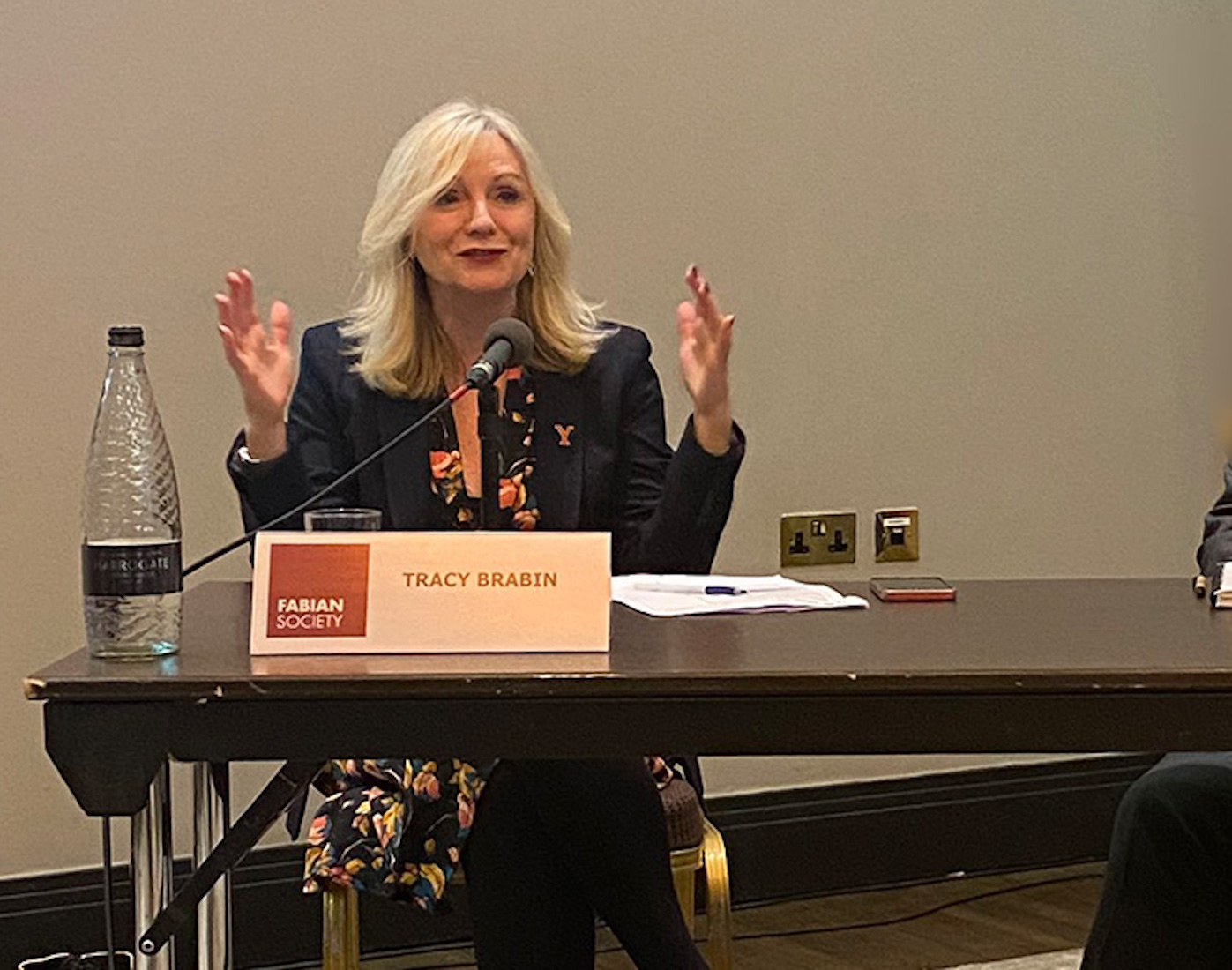Centre stage
Tracy Brabin is the first woman to be elected as a metro mayor. She chats to Kate Murray about her top priorities in office, from safety for women and girls to standing up for the north
On the surface, a career as an actor on some of Britain’s best-loved TV programmes might seem to have little in common with success in politics. But Tracy Brabin, Coronation Street star turned MP and then mayor of West Yorkshire, says the key quality she needed when she first entered parliament after the murder of Jo Cox was one she drew from her previous life.
“Actors are often incredibly empathetic people – they have to be because you have to get under the skin of a character and play for real and in order to do that you need to understand them,” she explains. “And I think that the MP for Batley and Spen at that time needed to be somebody with bucket loads of empathy, because it wasn’t about being a political animal. It was about supporting a community at its worst time, listening and being kind. And so empathy was very helpful. I would suggest it would be a prerequisite for all MPs but not everybody has it.”
We are talking at the height of the scandal over Number 10’s Christmas parties in the face of coronavirus restrictions, so the issue of being in touch with the public and sensitive to what they’re going through feels particularly salient.
“I think there is an empathy bypass in Number 10,” Brabin says. “They don’t understand the sacrifices people have made because they just don’t get it.”
“Their empathy bypass is where they’re going to lose. Because people realise they lent them their vote and they’ve just been made a laughing stock.”
Brabin’s own background, is, she laughs, ‘Yorkshire through and through’. Brought up in social housing, her pre-politics life was not without its struggles. “Being a creative freelancer, where we have been worried about paying the mortgage, having to borrow money from parents, thinking about selling the car. Having been a child on free school meals, then seeing my own kids on free school meals, thinking ‘bloody hell, this job is so tough when you’re waiting for the next gig’. Being kept awake at night because you’re worried about money. I don’t think the majority of people in the Conservative party, and particularly those in parliament, really understand that fear.”
Back in May, Brabin swapped her Westminster seat for the West Yorkshire mayoralty, becoming the first woman ever elected as a metro mayor. She’s also one of only two mayors outside London to hold responsibility for policing – powers which meant she had to step down from parliament – and she’s determined to make the most of the role.
A key priority is tackling violence against women and girls, with a range of initiatives from more advisors to help victims of domestic violence to improved systems for those who report a sexual assault. It is an issue which has personal resonance for Brabin.
“I speak from experience, as do so many women: I was sexually assaulted at university by a stranger in the street who tried to rape me and batter me,” she says. “I was incredibly blessed actually in my recovery because he was arrested and he went to prison. Justice was served for me. So many other women don’t ever get that closure. They have to live with it all their lives knowing that that perpetrator got away with it. They have to work with them, or they sleep next to them or it’s their brother’s mate.”
Brabin likens her work in this area with her deputy mayor for crime and policing, Alison Lowe, as ‘two little speedboats’ working to turn a tanker around. West Yorkshire’s approach also includes putting funding into a safer public realm for women, and projects in universities and schools to help men and boys think about healthy relationships.
Austerity has had an impact on both the support services available for women and on the working of the criminal justice system. But important too, according to Brabin, is addressing the societal changes, particularly ready access to online porn, that have had such an impact on attitudes towards women.
“We have to provide the safety net, but we also have to do the upstream work of intervening – [ensuring] people respect others, understand what consent is, are able to call each other out when things go too far, support each other in society to do the right thing.”
Brabin argues that a focus on women and girls is an issue of social justice. “If you’re talking about levelling up, how do we even level up our own region if 50 per cent plus of our citizens are living in fear, they can’t live freely, they can’t do the things they want to do without worrying whether they have to take keys with them, or take their trainers or bat off unwelcome advances?” she says.
“We’ve got to do everything in our power to free up the brilliance of women across our community, so that they can be the best they can be – and flourish.”
Brabin’s own position as a role model to women is one she takes seriously. She particularly relished being able to turn the ‘shouldergate’ incident – where she was trolled on social media for wearing a dress in parliament which revealed her shoulder – into a positive by auctioning the dress and making £20,000 for the Girl Guides.
“I know there are many women in positions where they don’t have that voice. They just have to take it in their workplace, the ‘banter’,” she says. “I do have a responsibility to other women. Part of that responsibility is to be a ladder dropper to enable other women to get to senior roles. When you are in a senior position as a woman you do need to support others by talking about gender.”
When she spoke at the Fabian Society northern conference last month, Brabin condemned the toxicity in politics, telling the audience she had to have police at her surgeries. The problem, she says, comes from the very top, with Boris Johnson fuelling the negative atmosphere with his language around Brexit.
“It’s so shocking that it becomes so much part of the job,” she says. “My issue was always with our young members of staff that have to triage that and how it gets you down. My own kids used to watch it and burst into tears and say, ‘Mum how can you do this job and everybody hates you?’ I said, they’re a small minority, but with the loudest voice, but it does stop good people engaging with you online, because they don’t want the pile-on. So it’s anti-democratic, actually.”
Being a mayor rather than an MP has meant Brabin feels she is seen as a local voice and ‘more liked and more welcomed’ as a result than she was in her stint as an MP. But she still worries about the lack of trust in politicians which has become so acute in the last few years. That won’t have been helped by the latest government U-turn when it decided to scale back plans for high-speed rail to – and across – the north.
“The sense of betrayal is off the scale and people are furious,’ says Brabin. “What is even worse is people saying ‘well what else would you expect?’ But we should expect the best, we should expect the same investment as the investment that goes into the south.”
“We needed that HS2 to get the fast intercity train and to get freight off the roads, so we could have more stopping trains and connect our towns with our new workspaces, our communities end loneliness and create opportunities for youngsters.”
Brabin is hoping Conservative politicians across the north will speak up for their communities on the need for more infrastructure investment. Transport, she says, will determine the success and failure of so much, from tackling climate change to ensuring young people have easy access to good education, training and jobs.
“How are you committed to a green agenda when 70 per cent of all people who commute to work into a city in the north are using their car, when 100,000 people a day are on M1? You have to get them onto trains and the only way to do it is to increase capacity.”
In future, Brabin insists, the London-centric approach has to change so that regions like hers can make their own decisions on investment.
“I want us to be sustainable. I do not want to keep going down to London with a begging bowl,” she says. “Going for beauty contests, where we don’t win, or where we win, and it’s small amounts of money that should have been given to us anyway, to build a swimming pool. Back in the day your councils built swimming pools and gyms. And now we have to go to government to go into a competition to get the things that actually we should be entitled to. So I want us to be sustainable, but also to have inclusive growth across West Yorkshire.”
In the meantime, she is relishing the opportunity to make a real difference in her home patch.
“It is a super job. You know, I just would really encourage everyone to get into local government politics, I do think being a mayor is quite compelling.”
“We really are the engines of change and we will help Labour get back into Number 10.”
So doesn’t she miss her former life on screen?
“I don’t miss it at all. I thought I would, and both my girls are actors, my husband’s a TV director, but I have no yearning at all to go back,” she says. “This job is so interesting, and so exciting. I feel at the heart of things to deliver. The idea that you’re at the centre of change is very compelling.”

